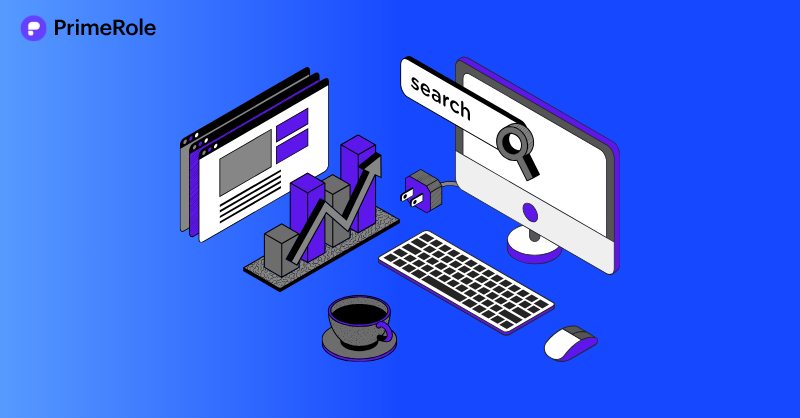
Data enrichment is crucial for modern sales and marketing teams. With accurate and up-to-date information, you can enhance prospecting, personalize your outreach, and increase conversion rates. Whether you are contacting a cold lead or retargeting existing customers, enriched data allows you to communicate with the right person at the right time and with the right message.
According to Grand View Research, the global data enrichment market is projected to reach $4.58 billion by 2030, indicating that businesses are beginning to recognize its importance.
In this guide, we will explain what data enrichment is, why it is important, and how to effectively incorporate it into your strategy for 2025.
Table of Contents:
- What is Data Enrichment?
- Why is Data Enrichment Important?
- Types of Data Enrichment
- Data Enrichment Best Practices
- Top B2B Data Enrichment Tools
- Conclusion
- Data Enrichment Frequently Ask Questions (FAQs)
What is Data Enrichment?
Data enrichment is the process of enhancing raw or incomplete data with additional, relevant information to make it more valuable and actionable. This means building a richer, more complete profile by taking your existing customer or prospect data and supplementing it with new details such as firmographics, demographics, behavioral insights, or third-party intelligence.
Think of data enrichment as upgrading an essential contact list into a dynamic, multi-dimensional resource. Instead of just knowing a company’s name and email, you’ll also know its industry, size, location, tech stack, recent funding rounds, and key decision-makers. This enriched data empowers sales, marketing, and customer success teams to personalize outreach, segment audiences, and make smarter business decisions.
Drive More Revenue with Verified B2B Data
Boost pipeline performance with PrimeRole’s multi-source enrichment and real-time contact intelligence.
Why is Data Enrichment Important?
Enriched data is meaningful, contextual, and ready to power smarter business decisions. The ability to enrich customer and prospect data provides a competitive edge that touches nearly every department, from marketing and sales to operations and leadership. Data enrichment provides several key benefits, such as:
Improvement in Lead Quality
Data enrichment helps businesses filter out low-quality or irrelevant leads by enhancing records with firmographic, demographic, or behavioral insights. With this added context, teams can prioritize leads that closely match their ideal customer profile (ICP), improving win rates and shortening sales cycles.
Improved Customer Targeting and Segmentation
By enriching your CRM with more complete and accurate data, you can segment your audience with precision. You can use factors like industry, company size, job title, behavior, and geography. This allows marketing teams to deliver hyper-targeted campaigns, create personalized journeys, and optimize outreach for higher engagement.
Saves Time and Resources
Manually researching and filling in customer details is tedious and error-prone. Automated data enrichment tools eliminate that burden by populating fields instantly and accurately. This not only improves data quality but also frees up time for your sales and marketing teams to focus on high-value tasks like prospecting and closing deals.
Increases Campaign Effectiveness
More accurate and complete customer data means better personalization. With enriched profiles, marketers can tailor their content, offers, and timing based on real-time customer insights. This leads to higher email open rates, improved click-throughs, and ultimately, greater ROI from every campaign.
Reduced Costs and Improved Efficiency
Targeting the wrong prospects costs money. Whether it's wasted ad spend, lost time, or missed opportunities, the impact can be significant. Enriched data minimizes these inefficiencies by ensuring your campaigns and sales outreach are focused on the right people. It also supports automation, streamlining repetitive tasks and lowering operational overhead.
Strengthens Decision-Making
Data enrichment empowers leadership to gain a comprehensive view of their customers, markets, and performance metrics. With enriched and reliable data, they can make strategic decisions such as market expansion, product development, or sales forecasting with greater confidence and speed.
Types of Data Enrichment
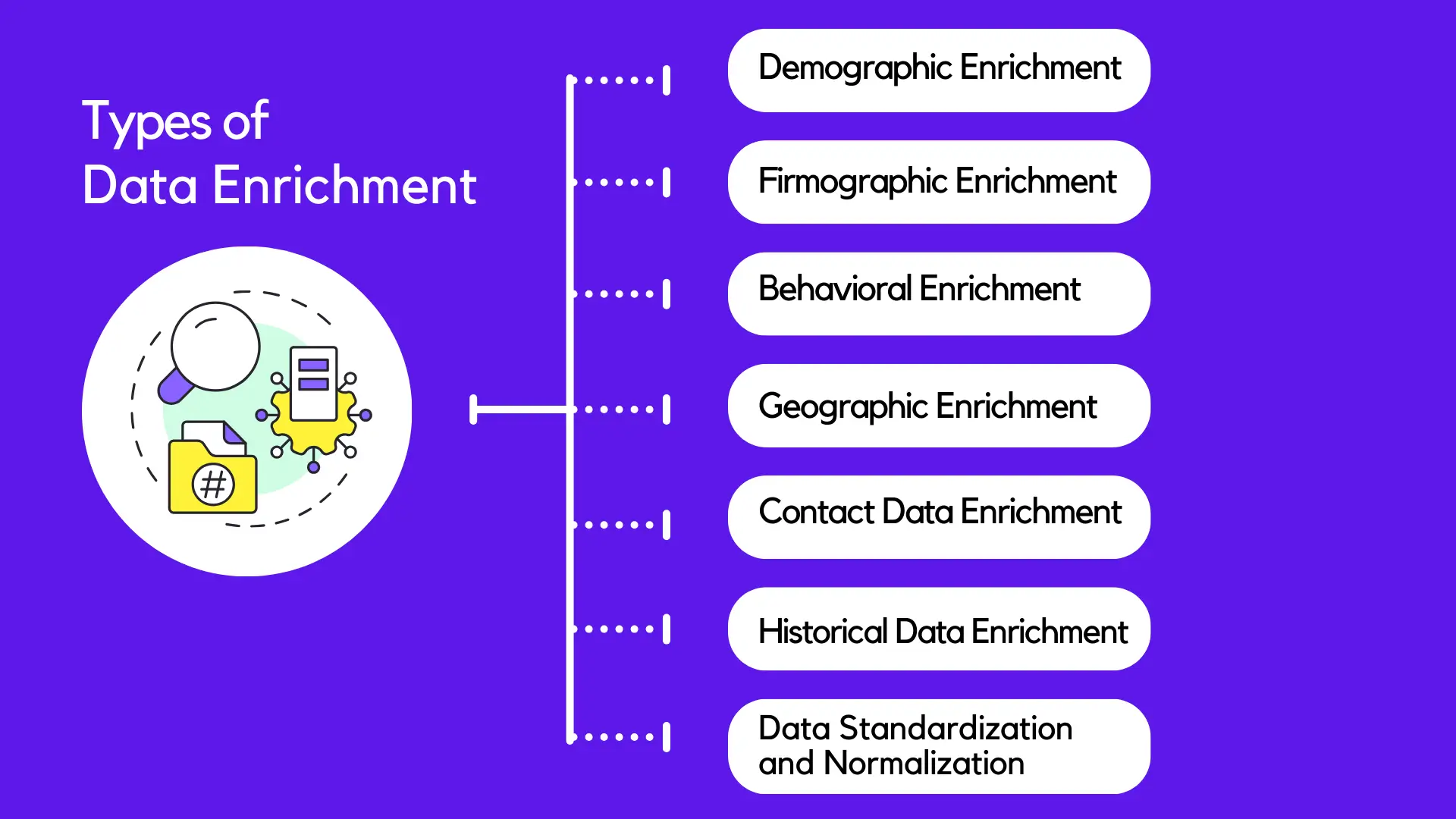
There are several types of enriched data that you can utilize for business depending on the specific goals, the nature of your customer data, and your industry. Some of the most valuable data enrichment types for businesses include:
1. Demographic Enrichment
Demographic enrichment adds personal-level information such as age, gender, education level, income bracket, and marital status to your existing records. This enrichment type helps create more targeted marketing personas and fine-tune messaging to better match the preferences and behaviors of your audience.
2. Firmographic Enrichment
Firmographic enrichment is especially important in B2B. It involves adding business-related details such as company name, industry, employee size, revenue, and company location. With firmographic data, businesses can better segment leads based on organizational attributes, enabling more relevant outreach and helping sales teams focus on high-value accounts.
3. Behavioral Enrichment
Behavioral enrichment involves tracking and enriching customer records with data based on their interactions with your digital assets. This includes page visits, email clicks, content downloads, ad interactions, and webinar attendance. This data enrichment example helps marketing and sales teams understand a lead’s intent and readiness to purchase, allowing for smarter lead scoring and personalized follow-ups.
4. Geographic Enrichment
Geographic enrichment enhances your data by adding location-based attributes such as city, state, postal code, country, and even timezone or climate zone. This data enables regional segmentation, localized campaigns, and better territory management for sales teams. For instance, promoting different offerings to companies in the U.S. versus Europe based on market demands or regulations becomes more effective with geographic enrichment.
5. Contact Data Enrichment
Contact data enrichment enhances basic contact records with critical information such as job titles, departments, LinkedIn profiles, phone numbers, and validated email addresses. This helps ensure your outreach efforts are targeting the right individuals in an organization. For example, identifying the Head of Procurement rather than a generic “[email protected]” contact makes a huge difference in conversion rates.
6. Historical Data Enrichment
Historical data enrichment involves incorporating past behavior or performance metrics into customer profiles. This could include previous purchases, support tickets, webinar attendance, or content downloads. Such enriched data helps identify patterns, allowing for better forecasting, churn prediction, and the creation of personalized re-engagement strategies.
7. Data Standardization and Normalization
While not a traditional enrichment type, standardization ensures all your enriched data is consistent in format. This includes consistent date formats, naming conventions, phone number styles, and address structures. This step is crucial for accurate reporting, clean integrations between platforms, and reliable automation processes across systems like CRMs and email marketing tools.
Data Enrichment Best Practices
While the exact data enrichment process will vary depending on your business goals, tech stack, and the kind of data you’re working with, there are universal best practices that consistently deliver results. The following principles help ensure your enriched data is accurate, scalable, and aligned with business objectives.
Start with a Clear Ideal Customer Profile (ICP)
Before enriching your data, define exactly who your ideal customer is. A well-crafted Ideal Customer Profile (ICP) outlines the characteristics of the companies and people most likely to buy from you. This includes firmographic data like company size, industry, revenue, and geography, as well as demographic and behavioral insights such as job roles, seniority, and buying intent.
When your enrichment strategy aligns with a precise ICP, you avoid wasting resources on irrelevant or low-quality leads. Instead, you’ll gain access to data that is truly actionable. These are contacts that match your target persona and are more likely to convert. This clarity forms the foundation for smarter segmentation, prioritization, and outreach.
Use Multi-Source Enrichment
Relying on a single data source can lead to incomplete or outdated information. No single provider has a perfect dataset, which is why multi-source enrichment is a critical best practice. This involves aggregating and verifying data from multiple providers to enhance accuracy, completeness, and coverage.
PrimeRole follows this approach using a waterfall enrichment model. It pulls contact and company information from several premium data vendors in sequence. If one source lacks a specific detail, such as a direct dial or verified email, the next source is automatically queried. This approach significantly improves data reliability, reduces bounce rates, and ensures your team has access to verified, sales-ready leads.
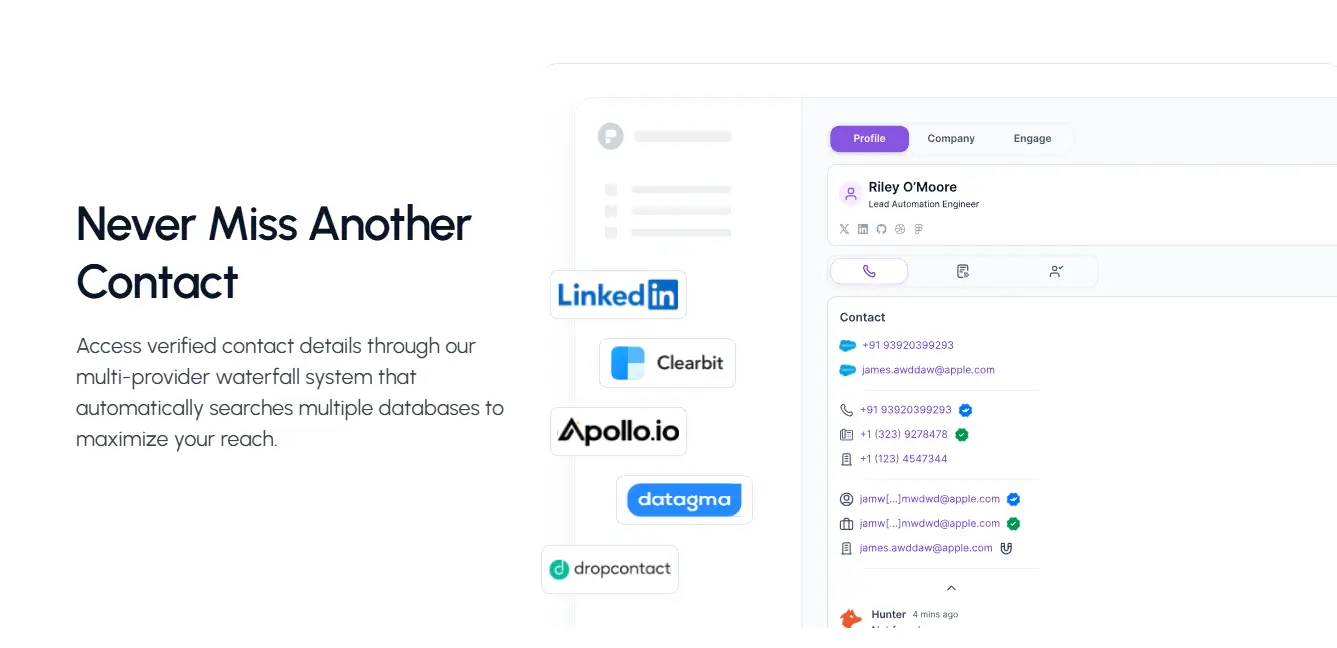
Focus on Real-Time Accuracy
In today’s dynamic business environment, data becomes outdated quickly. People change jobs, companies pivot, and decision-makers move. That’s why real-time enrichment is essential. Instead of enriching data once and hoping it remains accurate, real-time enrichment ensures your information is refreshed at the moment it's needed, whether during prospecting, outreach, or lead routing.
Using enrichment solutions that offer real-time capabilities helps sales teams avoid targeting outdated leads or contacting the wrong people. This improves productivity, boosts first-touch engagement, and reduces wasted effort across the funnel.
Verify Before You Trust
Accuracy is everything in data-driven sales. Even if data fields appear complete, they may not be valid. Unverified contact details, especially email addresses and phone numbers, can result in hard bounces, failed calls, and damage to your sender reputation. To prevent this, a robust verification layer must accompany your enrichment process.
Make sure your platform or enrichment provider checks email deliverability, validates phone numbers, and flags outdated or risky records. This ensures that your enriched data is not only complete but also reliable. As a result, your team can work more efficiently and confidently.
Enrich at the Right Points in Your Workflow
Data enrichment should not be a one-time task. Many businesses enrich records only during the initial CRM import, but this ignores how quickly data can degrade. Best practice is to enrich at multiple points within your workflow: during form submissions, lead routing, pre-outreach preparation, and through regular CRM maintenance.
By enriching data throughout your pipeline, your team always works with high-quality, current information. This supports more accurate lead scoring, sharper segmentation, and personalized outreach at every touchpoint.
Respect Compliance and Privacy Laws
With the rise of privacy regulations such as GDPR, CCPA, and others, it is essential to handle data enrichment in a compliant and ethical way. This includes using responsibly sourced data, being transparent about how data is collected, and honoring opt-out preferences.
Always ensure your enrichment provider complies with data protection standards and follows ethical practices. Doing so not only reduces legal risk but also strengthens your reputation with prospects who care about how their information is handled.
Target the Right Buyers with Laser Precision
Use enriched insights to personalize outreach and connect with decision-makers that matter most.
Top B2B Data Enrichment Tools
Choosing the right data enrichment tool can make or break your lead generation and customer engagement strategies. Below are the top-performing tools B2B teams are relying on in 2025 to enrich data, enhance CRM accuracy, and drive smarter decisions.
1. PrimeRole
PrimeRole is a next-generation, AI-driven sales intelligence platform designed to deliver unmatched contact and company data coverage for B2B teams. It stands out for its multi-provider enrichment, advanced verification, and seamless integration capabilities.
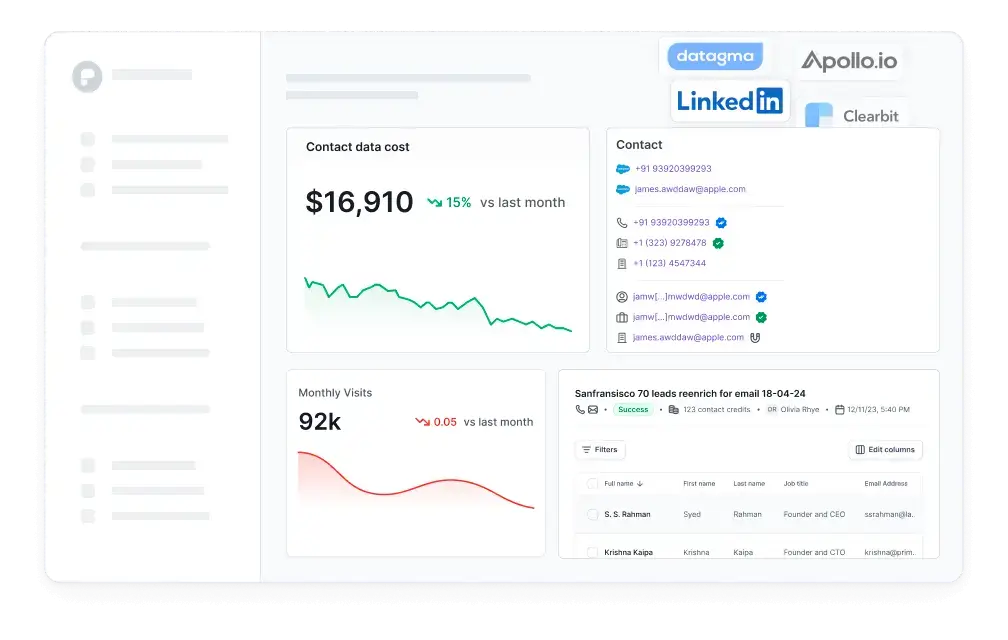
Key Features:
- Multi-Provider Waterfall Enrichment: Ensures the most complete and accurate contact and company data by intelligently sourcing from multiple premium providers.
- Advanced Verification: Multi-level email validation, phone ownership verification, and cross-provider data validation with intelligent confidence scoring to eliminate bad data.
- AI-Powered ICP Matching: Real-time Ideal Customer Profile (ICP) and persona assessment using website signals and profile data, helping you find perfect-fit prospects faster.
- Technographic Insights: Technographic data pulled from three or more sources and verified with AI for unparalleled accuracy.
- Automated Bulk Enrichment: Quickly enrich large lists of contacts and companies.
- Custom Alerts: Get notified of key account changes, such as team growth or funding events.
- Seamless Integrations: Highly customizable two-way CRM sync, native CRM apps, real-time data updates, and the ability to push data to data lakes and engagement tools.
- Enterprise-Grade Security: Built with robust security and compliance to help you build trust with your customers.
Use Cases:
- Outbound Sales: Engage the right contacts at the right time to accelerate your pipeline.
- Account Management: Anticipate customer needs with deep company insights.
- Marketing: Precision targeting using impactful signals to maximize ROI.
Pricing:
PrimeRole offers flexible, tiered pricing based on data volume and feature requirements. Contact PrimeRole for a custom quote and to schedule a free demo.
2. ZoomInfo
ZoomInfo is a heavyweight in the B2B data enrichment world. Known for its vast U.S.-focused contact and company database, it's a go-to for sales, marketing, and talent teams looking to enrich and activate data at scale.
ZoomInfo doesn’t just provide data; it helps assess its health through embedded reports and enrichment metrics.
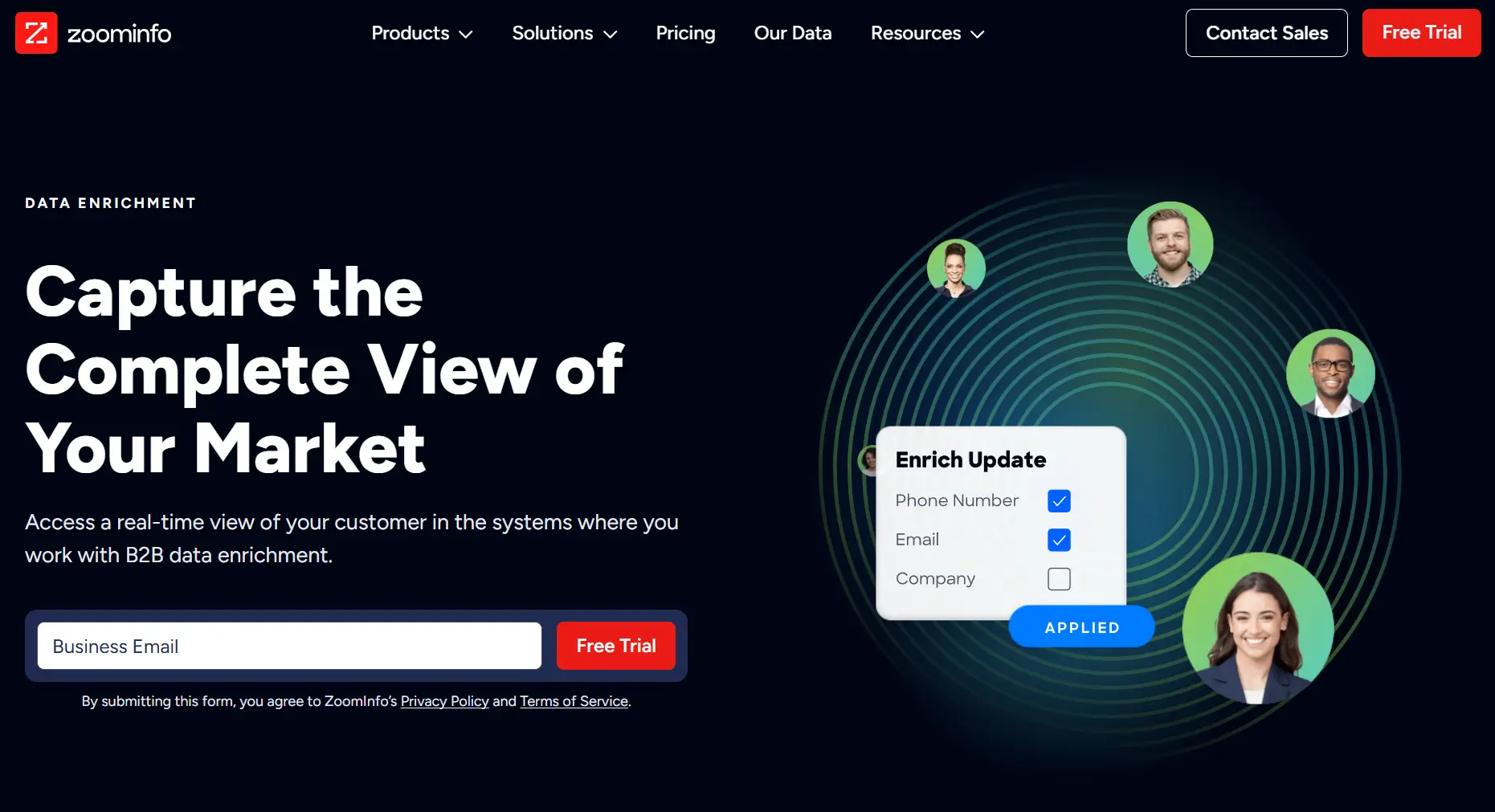
Top Features:
- Multiple enrichment packages (Essentials, Premium, Premium+, etc.)
- Intent data to prioritize high-value leads
- Technographics to uncover what tools your prospects are already using
- Real-time updates via webhooks and APIs
Pricing:
ZoomInfo offers a 14-day free trial. Pricing varies depending on department (sales, marketing, recruiting) and usage. Contact their sales team for a custom quote.
3. Apollo.io
Apollo.io is a go-to enrichment solution for growing teams, offering a database of 275M+ contacts. Its Data Health Center proactively flags outdated or missing information, helping you clean and enrich data automatically.
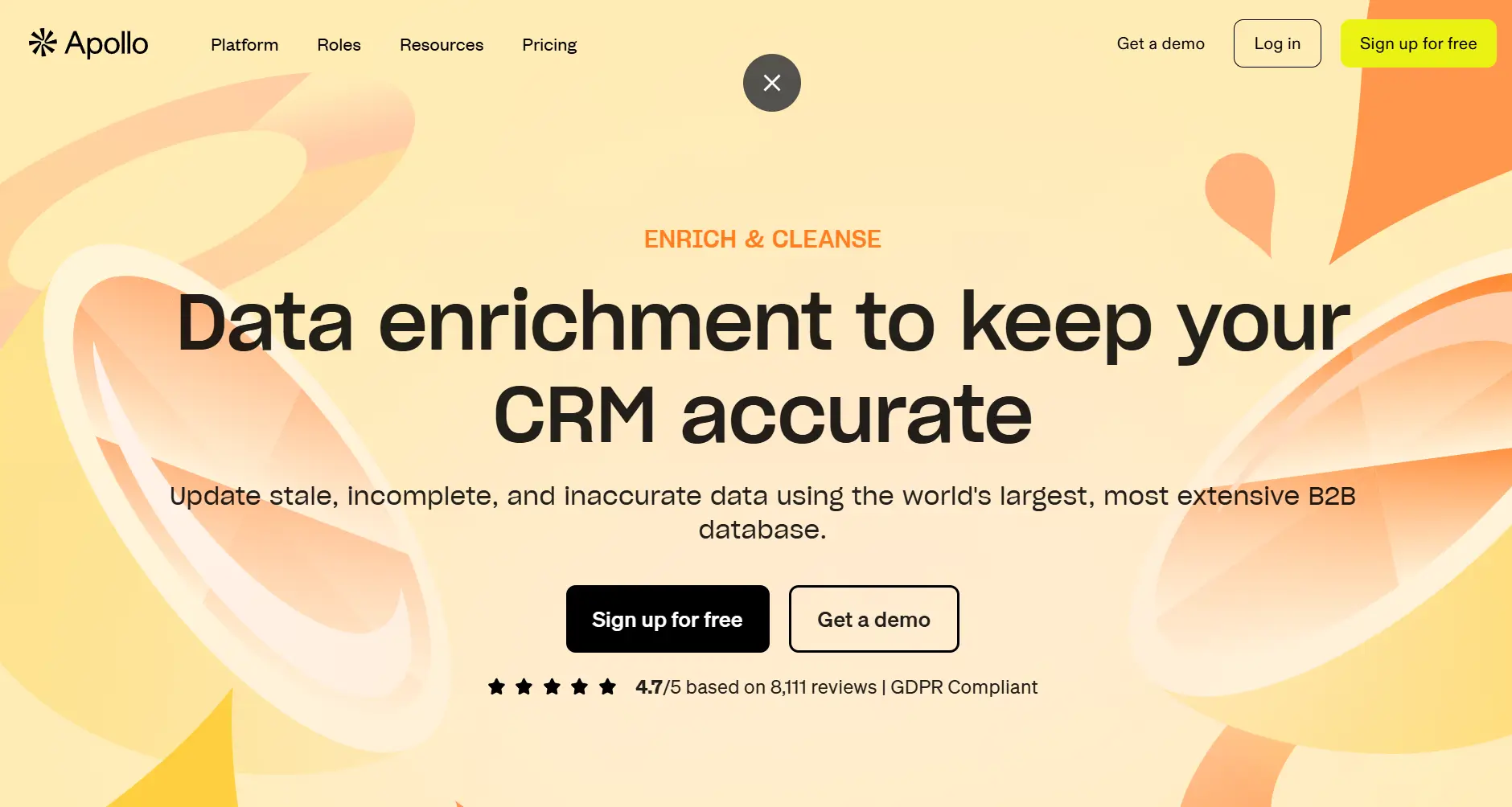
Top Features:
- Massive B2B contact database
- Data Health Center to spot inaccuracies
- Job change alerts and missing data detection
- Automated enrichment scheduling
- Unlock your TAM with enriched insights
Pricing:
- Free plan available
- Paid plans start from $49/month (Basic Plan)
4. Lusha
Lusha helps sales teams quickly find and connect with the right decision-makers. It’s great for enriching CRM data with up-to-date contact and company information, especially when used in combination with its Chrome extension for LinkedIn.
Thanks to Lusha’s Trust-Filters™, you get only validated, reliable data, ensuring your campaigns hit the mark.
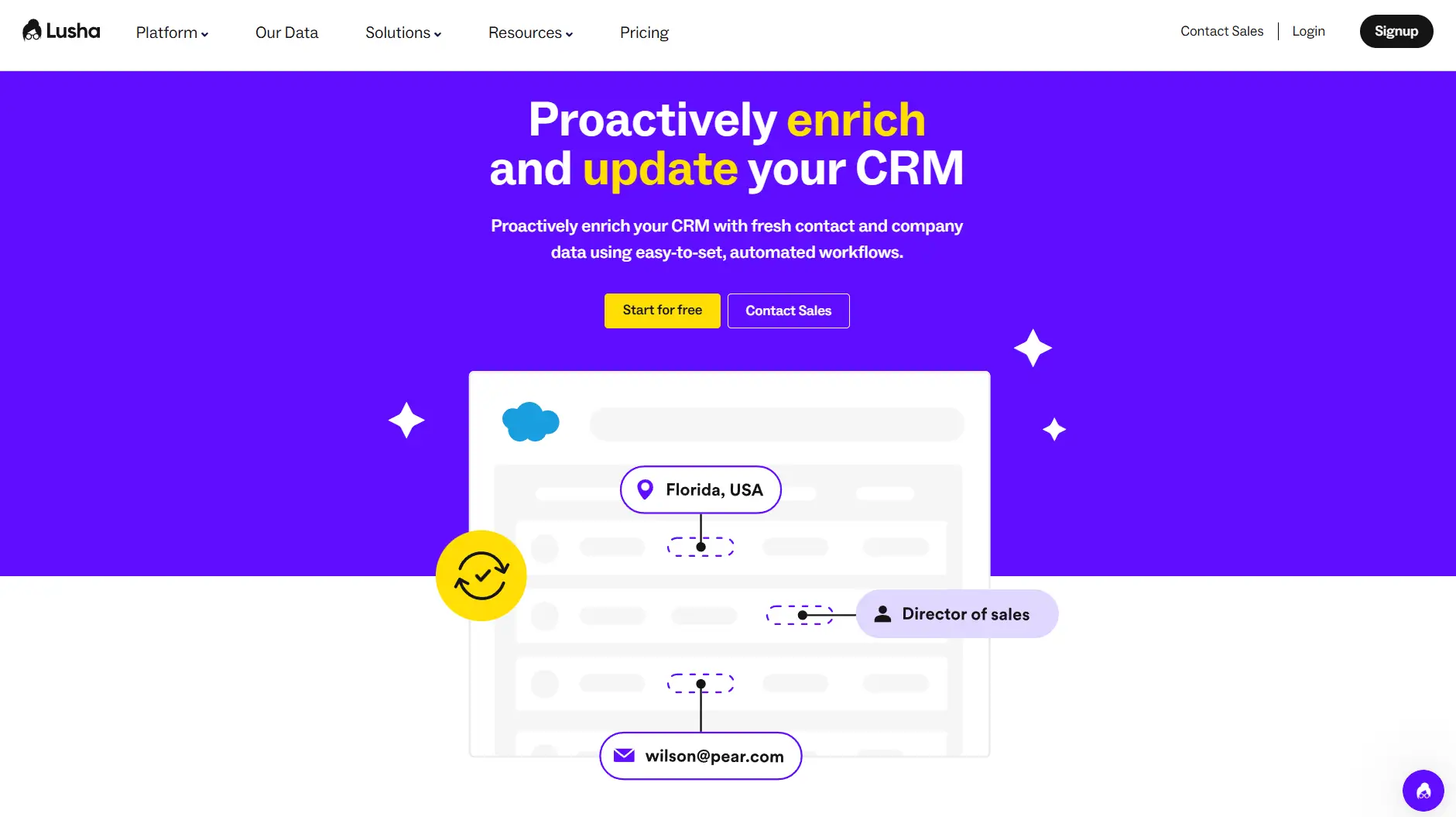
Top Features:
- LinkedIn Chrome extension
- 7 Trust-Filters™ for precise targeting
- Intent data and job change notifications
- CRM enrichment in bulk
Pricing:
Lusha offers a free plan. Paid subscriptions start at $36 per user/month for the Pro Plan.
5. Clearout
Clearout is primarily known for its top-tier email validation capabilities, but it also offers robust data enrichment features that make email campaigns more reliable and effective.
Ideal for marketers and data teams, Clearout ensures your emails land where they should and that the leads you’re contacting are legit.
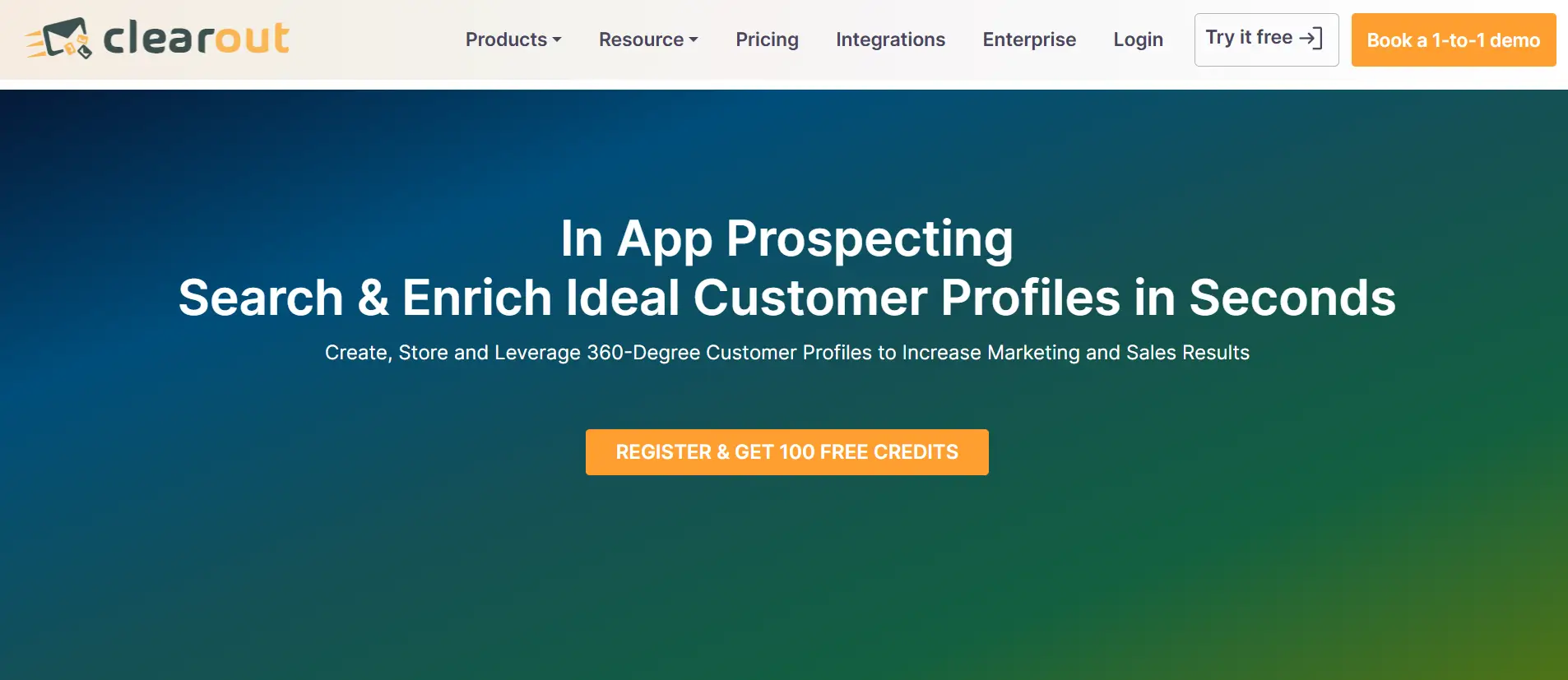
Top Features:
- Real-time email verification
- Detects catch-all, disposable, and spam-trap emails
- Enriches email addresses with company and demographic data
- High deliverability scores for outbound campaigns
Pricing:
Clearout offers pay-as-you-go and subscription plans, starting at $21 per month.
Conclusion
Data enrichment is essential for B2B businesses that rely on accurate customer data to drive sales, marketing, and operational success. From boosting lead quality to personalizing customer journeys and improving ROI, enriched data is the fuel that powers smarter decisions and better outcomes.
With so many benefits, it’s crucial to choose a data enrichment solution that aligns with your specific business goals. See how PrimeRole can help you enrich your customer data, personalize outreach, and win more deals.
Data Enrichment Frequently Ask Questions (FAQs)
What is the meaning of data enrichment?
Data enrichment is the process of enhancing existing datasets by adding external or missing information to make the data more complete, accurate, and actionable for business decisions.
What is data enrichment in data quality?
In data quality, data enrichment improves the accuracy, consistency, and completeness of records by appending validated and updated information from reliable internal or third-party sources.
What are the benefits of data enrichment?
Data enrichment helps improve customer segmentation, lead scoring, personalization, and decision-making by giving businesses deeper insights into their prospects and customers.
What are some data enrichment techniques?
Common techniques include demographic enrichment, firmographic data appending, intent data analysis, email verification, and social media profiling to enhance customer records.
